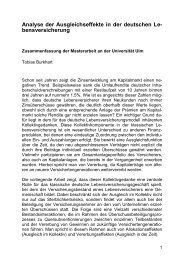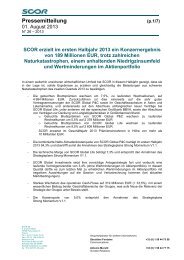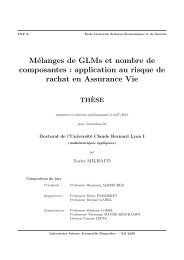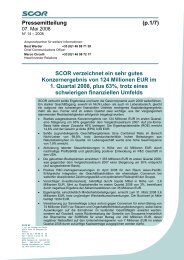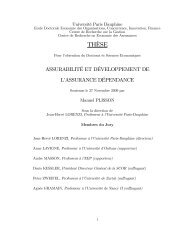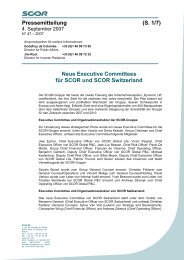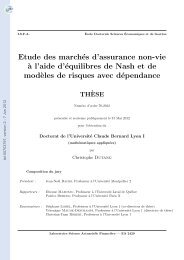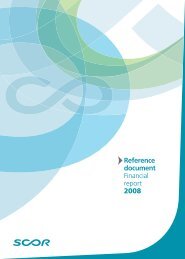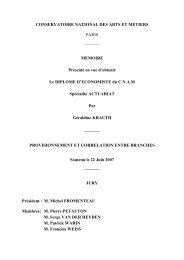4.4 Legal risk - Scor
4.4 Legal risk - Scor
4.4 Legal risk - Scor
Create successful ePaper yourself
Turn your PDF publications into a flip-book with our unique Google optimized e-Paper software.
On the other hand, an increase in interest rates and/or fluctuations in the capital markets could lead to a fall in the market<br />
value of fixed income securities SCOR holds. In the case of a need for cash the Group may be obliged to sell fixed income<br />
securities, possibly resulting in capital losses to the Group.<br />
SCOR analyzes the impact of a major change in interest rates on each of its portfolios and at the global level and identifies<br />
the unrealized capital loss that would result from a rise in interest rates. The instantaneous unrealized capital loss is<br />
measured for a uniform increase of 100 basis points in rates or in the event of a distortion of the structure of the yield curve.<br />
Portfolio sensitivity analysis to interest rate changes is an important <strong>risk</strong> measurement and management tool which may<br />
lead to decisions for reallocation or hedging.<br />
However, there can be no assurance that its <strong>risk</strong> management measures and sensitivity analysis will be sufficient to protect<br />
the Group against all the <strong>risk</strong>s related to variations in interest rates.<br />
(ii)<br />
Interest rate <strong>risk</strong>s on financial debt<br />
Financial debt is not carried at fair value. For the Group, interest rate <strong>risk</strong> is limited to the interest paid on variable rate debt.<br />
(iii) Interest rate <strong>risk</strong>s on insurance liabilities<br />
The Group has certain life insurance contracts which are sensitive to fluctuations in interest rates.<br />
Life<br />
Although in general all long term liabilities are discounted, in most cases there is no immediate accounting impact from a<br />
100 basis point change in interest for the following reasons:<br />
• For the German, Italian, Swiss and Austrian markets, valuation interest rates are typically locked-in at the minimum<br />
interest rate guaranteed by the ceding companies on the deposited assets covering the liabilities.<br />
• For the business written in the U.K., Scandinavia, U.S. (traditional, non-savings products), and France (excluding<br />
Long Term Care), valuation interest rates are locked-in based on a prudent estimate of the expected rate earned<br />
on assets held less a provision for adverse deviation.<br />
There is no requirement for a material change in reserves for life products with guaranteed minimum death benefit (GMDB)<br />
in the event of a 100 basis point change in interest rates.<br />
For Long Term Care products in France, ceding companies use valuation rates established by French regulators which are<br />
based on a prudent proportion of the moving average of long-term government rates. The bulk of the reserves are<br />
deposited. The interests on these deposits are often linked to the assets of the ceding companies and minimum interest<br />
rates on deposits are at least the valuation rate. Ceding companies are usually doing a proper matching of assets and<br />
liabilities. Hence a 100 basis point decrease in interest rates would have no significant impact.<br />
Non-Life<br />
There are no material amounts of discounted reserves in the Non-Life portfolio which would result in interest sensitivities.<br />
Additionally, for lines of business where there are interest sensitivities at the level of the ceding company and for which no<br />
direct information on these sensitivities is submitted to SCOR level (e.g., the bodily injury portion of automobile), SCOR<br />
considers that the information provided by the ceding company is not necessarily representative of the evolution in interest<br />
rates. The IBNR calculations performed by SCOR using methods other than the loss ratio method do not represent a<br />
material portion of the recorded reserves and therefore the sensitivity is not considered material.<br />
(c) Valuation <strong>risk</strong><br />
Valuation <strong>risk</strong> is the <strong>risk</strong> that the fair value of future cash flows of a financial instrument will fluctuate due to changes in<br />
market prices (other than those arising from interest rate <strong>risk</strong> or currency <strong>risk</strong>), whether those changes are caused by factors<br />
specific to the individual financial instrument or its issuer, or factors affecting all similar financial instruments traded in the<br />
market.<br />
The Group’s valuation exposure relates to financial assets and financial liabilities whose values will fluctuate as a result of<br />
changes in market prices, principally investments in equity securities.<br />
(i)<br />
Valuation <strong>risk</strong> on investments<br />
The majority of the Group’s investments are in debt securities. For investments made in equity securities, the Group’s<br />
objective is to develop and manage a high-quality diversified portfolio. The equity portfolio is regularly monitored.<br />
All investments, whether held directly or in mutual funds, are aggregated and valued on a regular basis. This approach<br />
allows for the monitoring of changes in the portfolio and the identification of investments with higher than average volatility.<br />
The Group’s exposure is reviewed at regular Investment Committee meetings.<br />
SCOR is also exposed to equity price <strong>risk</strong>. A widespread and sustained decline in the equity markets could result in an<br />
impairment of SCOR’s equity portfolio. Such impairment could affect the Group’s net income.<br />
284



